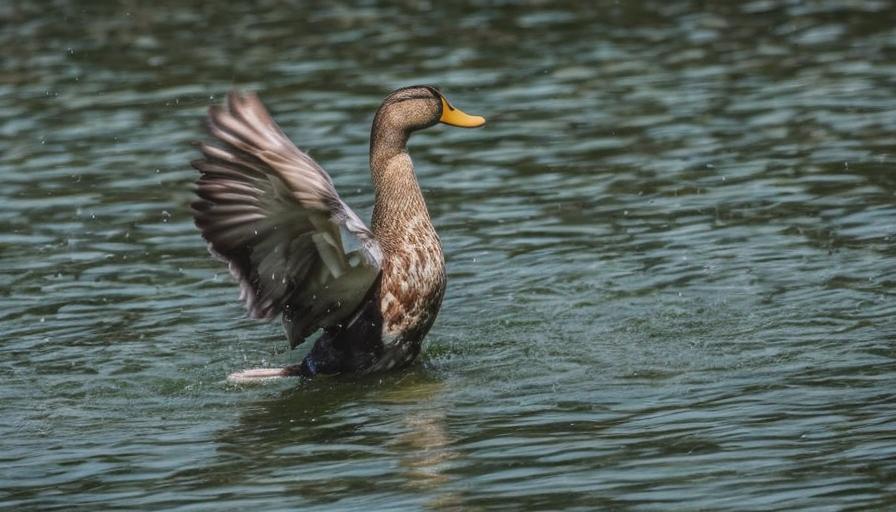Large domestic duck breeds are a popular choice for many farmers and homesteaders due to their size, meat production, and egg-laying capabilities. These ducks are known for their robust nature, adaptability to various climates, and their ability to thrive in both free-range and confined environments. Large domestic duck breeds are also valued for their pest control abilities, as they are known to consume large quantities of insects, slugs, and snails. Additionally, these ducks are often raised for their down feathers, which are used in the production of pillows, comforters, and other bedding products.
Large domestic duck breeds come in a variety of colors and patterns, making them an attractive addition to any farm or backyard flock. They are also known for their friendly and sociable nature, making them a popular choice for families with children. Whether you are looking to raise ducks for meat, eggs, pest control, or simply as pets, large domestic duck breeds offer a wide range of benefits and opportunities for farmers and homesteaders.
Key Takeaways
- Large domestic duck breeds are popular for their size, meat production, and egg-laying capabilities.
- Large domestic duck breeds are known for their hardiness, adaptability, and calm temperament.
- Popular breeds of large domestic ducks include the Pekin, Muscovy, and Rouen.
- Housing and care for large domestic duck breeds require adequate space, protection from predators, and access to water.
- Feeding and nutrition for large domestic duck breeds should include a balanced diet of commercial feed, greens, and access to water for foraging.
Characteristics of Large Domestic Duck Breeds
Large domestic duck breeds are known for their size and robust build, making them an excellent choice for meat production. These ducks typically weigh between 8-12 pounds, with some breeds reaching even larger sizes. They have a broad breast and thick legs, making them a popular choice for those looking to raise ducks for meat. In addition to their size, large domestic duck breeds are also valued for their egg-laying capabilities. Many breeds are known to lay a high number of eggs each year, making them a valuable addition to any farm or homestead.
Large domestic duck breeds are also known for their adaptability to various climates and environments. They are able to thrive in both cold and warm climates, making them a versatile choice for farmers and homesteaders in different regions. These ducks are also known for their hardiness and resistance to common poultry diseases, making them a low-maintenance option for those looking to raise ducks. Overall, the characteristics of large domestic duck breeds make them a valuable and versatile addition to any farm or homestead.
Popular Breeds of Large Domestic Ducks
There are several popular breeds of large domestic ducks that are commonly raised for meat, eggs, and pest control. One of the most well-known breeds is the Pekin duck, which is valued for its large size, rapid growth rate, and excellent meat production. Pekin ducks are also known for their friendly and sociable nature, making them a popular choice for those looking to raise ducks as pets. Another popular breed is the Muscovy duck, which is valued for its lean and flavorful meat, as well as its ability to forage for food and control pests.
The Rouen duck is another popular breed of large domestic duck, known for its striking plumage and excellent meat production. This breed is often raised for its beautiful appearance as well as its meat and egg-laying capabilities. The Khaki Campbell duck is valued for its high egg production, with some hens laying up to 300 eggs per year. This breed is also known for its excellent foraging abilities and adaptability to various climates. Overall, these popular breeds of large domestic ducks offer a wide range of benefits and opportunities for farmers and homesteaders.
Housing and Care for Large Domestic Duck Breeds
When it comes to housing and caring for large domestic duck breeds, there are several important considerations to keep in mind. These ducks require a secure and spacious coop or shelter that provides protection from predators and the elements. The coop should also have adequate ventilation and be easy to clean in order to maintain the health and well-being of the ducks. Additionally, large domestic duck breeds require access to a clean water source for drinking and bathing, as well as ample space for foraging and exercise.
In terms of care, it is important to provide large domestic duck breeds with a balanced diet that meets their nutritional needs. This may include a commercial poultry feed supplemented with fresh fruits and vegetables, as well as access to grit for digestion. It is also important to monitor the ducks for signs of illness or injury and provide appropriate veterinary care when needed. Overall, providing proper housing and care for large domestic duck breeds is essential for ensuring their health and well-being.
Feeding and Nutrition for Large Domestic Duck Breeds
Feeding and nutrition are crucial aspects of raising large domestic duck breeds, as a balanced diet is essential for their growth, egg production, and overall health. These ducks require a diet that is high in protein to support their growth and muscle development. A commercial poultry feed formulated specifically for ducks can provide the necessary nutrients, vitamins, and minerals that these birds need. In addition to the feed, it is important to supplement their diet with fresh fruits and vegetables, such as leafy greens, carrots, and peas.
Large domestic duck breeds also require access to grit, which helps them grind their food in their gizzards for proper digestion. Providing access to clean water is also essential, as ducks need water not only for drinking but also for bathing and preening their feathers. It is important to ensure that the water source is kept clean and free from contaminants to prevent illness in the ducks. Overall, proper feeding and nutrition are essential for the health and well-being of large domestic duck breeds.
Breeding and Reproduction of Large Domestic Duck Breeds

Breeding and reproduction are important considerations when raising large domestic duck breeds for meat or egg production. Ducks reach sexual maturity at around 5-7 months of age, at which point they can begin mating and laying eggs. It is important to provide a suitable nesting area within the coop or shelter where the ducks can lay their eggs in a safe and comfortable environment. The eggs should be collected daily to prevent them from being damaged or eaten by predators.
When it comes to breeding large domestic duck breeds, it is important to ensure that there is a proper ratio of drakes (males) to hens (females) in order to prevent aggression and over-mating. It is also important to monitor the ducks for signs of broodiness, as some hens may become protective of their eggs and attempt to hatch them. If breeding is desired, it is important to provide the necessary care and support for the broody hen during the incubation period. Overall, breeding and reproduction are important aspects of raising large domestic duck breeds for meat or egg production.
Uses and Benefits of Large Domestic Duck Breeds
Large domestic duck breeds offer a wide range of uses and benefits for farmers and homesteaders. These ducks are valued for their meat production, with many breeds known for their flavorful and lean meat that is prized by chefs and home cooks alike. In addition to meat production, large domestic duck breeds are also valued for their egg-laying capabilities, with some breeds laying a high number of eggs each year. Duck eggs are often used in baking and cooking due to their rich flavor and nutritional value.
Large domestic duck breeds also offer benefits in terms of pest control, as they are known to consume large quantities of insects, slugs, snails, and other pests. This can be particularly beneficial for farmers and gardeners looking to control pests in an environmentally friendly manner. Additionally, these ducks are often raised for their down feathers, which are used in the production of pillows, comforters, and other bedding products. Overall, the uses and benefits of large domestic duck breeds make them a valuable addition to any farm or homestead.
If you’re interested in large domestic duck breeds, you might also want to check out this informative article on how many eggs geese lay. It provides valuable insights into the breeding habits of geese, which can be helpful for anyone looking to expand their knowledge of poultry farming.
FAQs
What are some examples of large domestic duck breeds?
Some examples of large domestic duck breeds include the Pekin, Muscovy, Rouen, Aylesbury, and Cayuga.
What are the characteristics of large domestic duck breeds?
Large domestic duck breeds are known for their size, with males typically weighing between 8-12 pounds and females weighing between 7-10 pounds. They also have a calm and friendly temperament, making them suitable for backyard or farm settings.
What are the uses of large domestic duck breeds?
Large domestic duck breeds are commonly raised for meat production, as they have a good meat-to-bone ratio. They are also kept for their eggs, which are larger than those of smaller duck breeds.
What are the housing and care requirements for large domestic duck breeds?
Large domestic duck breeds require a spacious and secure enclosure with access to water for swimming and foraging. They also need protection from predators and proper nutrition to maintain their health and well-being.
Are large domestic duck breeds suitable for beginners?
Large domestic duck breeds can be suitable for beginners, as they are generally easy to care for and have a docile nature. However, it is important for beginners to research and understand the specific needs of these breeds before raising them.
Meet Walter, the feathered-friend fanatic of Florida! Nestled in the sunshine state, Walter struts through life with his feathered companions, clucking his way to happiness. With a coop that’s fancier than a five-star hotel, he’s the Don Juan of the chicken world. When he’s not teaching his hens to do the cha-cha, you’ll find him in a heated debate with his prized rooster, Sir Clucks-a-Lot. Walter’s poultry passion is no yolk; he’s the sunny-side-up guy you never knew you needed in your flock of friends!







